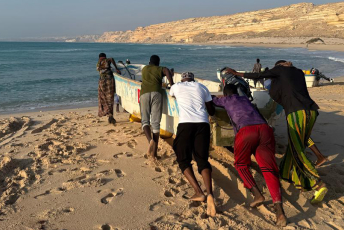Sarah Ddungu, a former public health official-turned-fisherwoman, says the trade in Nile perch swim bladders (a gas-filled organ underneath the fish that regulates its buoyancy in water) has given her and her family a good life in her retirement. Ddungu operates four boats on Lake Victoria in Uganda and sells the swim bladders separately to local middlemen who in turn sell them to Chinese buyers.
Increased demand for swim bladders has led to the illegal extraction of swim bladders from breeding and juvenile stocks thus depleting Lake Victoria’s Nile perch population and robbing East African countries of millions of dollars in revenue every year.
Swim bladders are considered a delicacy in Chinese cuisine and are used in Chinese traditional medicine to boost immunity, aid recovery and as an aphrodisiac. Swim bladders are also used in the manufacture of surgical threads.
The Chinese previously sourced swim bladders from the totoaba fish off the coast of Mexico, but this species is now endangered and its trade is highly regulated. As a result, since 2019, there has been an increased demand for the swim bladders of the Nile perch sourced from Lake Victoria.
In Kenya, over 290 tonnes of swim bladders were exported to Asia in 2018. Uganda, which produces at least 520 tonnes of Nile perch swim bladder annually, exported 51% of its catch to Hong Kong between 2012 and 2019. In 2018 alone, Uganda sold Nile perch swim bladders worth $52.1 million.
Patrick Otuo, an associate scientist at the Kenya Marine and Fisheries Research Institute, told ENACT that on the local market 1 kg of whole Nile perch fish is currently sold at $5, while 1 kg of Nile perch swim bladder on its own is sold to local middlemen at $200, making this the most profitable part of the fish. In international markets such as China, 1 kg of Nile perch swim bladder fetches up to $1 000. It’s even more expensive in Hong Kong, where 1 kg of Nile perch swim bladder can fetch up to $7 700.
Kenya, Uganda, and Tanzania collectively exported 1 747 tonnes of Nile perch swim bladders worth $124 million to Hong Kong in 2018. But recent studies show that the fish maw trade is estimated to contribute only $86 million to the East African region a year. This discrepancy is what East Africa is losing as a result of local fishermen selling swim bladders to foreign middlemen who sell them at increased prices in China and Hong Kong.
A 2020 Traffic study on fish maw trade found that locals and foreigners from China and India were involved in trading Nile perch swim bladders in and from East Africa. Fishermen in search of fish maws have been accused of harvesting juvenile fish that weigh one kilogram and below in order to extract fish maw, which is illegal. Once sold to middlemen, the fish maw is supplied to processing factories owned by Chinese traders.
Further, the demand for fish maw has led to the use of illegal fishing nets within Lake Victoria. The monofilament net, which is banned by Tanzania, has been used to catch Nile perch in Lake Victoria due to its ready availability in the Kenyan market. The monofilament net is made of plastic and does not decompose. In addition, catching immature fish is threatening the sustainability of fish species including that of the Nile perch in Lake Victoria.
However, the lack of uniform fishing regulations, especially in regard to fishing gear and nets in Lake Victoria enables illegal fishing.
Otuo told ENACT that the high demand for swim bladders from Lake Victoria has contributed to overfishing the Nile perch. This has implications for food security for local residents, who are forced to rely on immature fish or the small dagaa fish species for consumption.
The Uganda Fishmaws Traders Association reports that the demand for Nile perch swim bladders has led to unregulated gutting and extraction of the fish maw, which is contrary to the Ugandan Fisheries and Aquaculture Act of 2022. After extraction, thousands of kilograms of harvested Nile perch are dumped into Lake Victoria. Not only is this dumping illegal, but excessive fish waste also leads to oxygen depletion in the water and algae blooms, endangering living fish. They also contain bacteria and viruses harmful to humans.
Criminal activities within the fishing industry in East Africa are legislated variously under fishing laws in Kenya, Uganda and Tanzania. These regulatory regimes at the national level lack uniformity and thus a coherent response to the problem. This has hampered the operations and enforcement of the East African Community (EAC) Guidelines on Extraction, Processing, and Trading of Nile Perch Maws (2021).
Enforcing these guidelines would enable East African governments to control the extraction of Nile perch fish maw for the sustainability of the species and fish maw trade locally and globally. This includes minimising the fishing of immature Nile perch purely for the extraction of fish maws by ensuring that swim bladders are only extracted from Nile perch at least 52 cm long.
Incorporating the EAC guidelines on the fish maw trade into national fisheries and fish trade legislation would also provide the needed information to fisheries and customs officials to inspect, sample, test and certify swim bladders for export. Implementing the guidelines would ideally ensure equitable benefit sharing and reduce the current exploitation by Chinese and Indian traders, and also put more revenue in governments’ pockets.
Willis Okumu, Senior Researcher, Eastern Africa, ENACT Project







